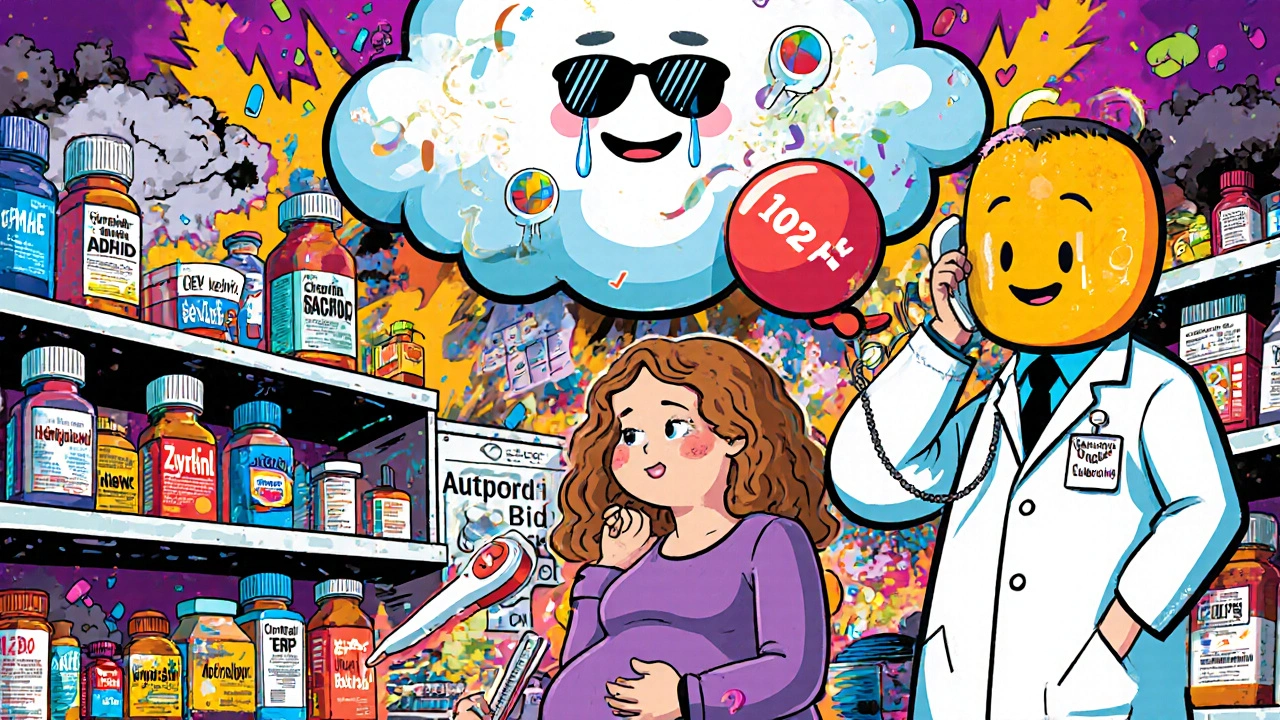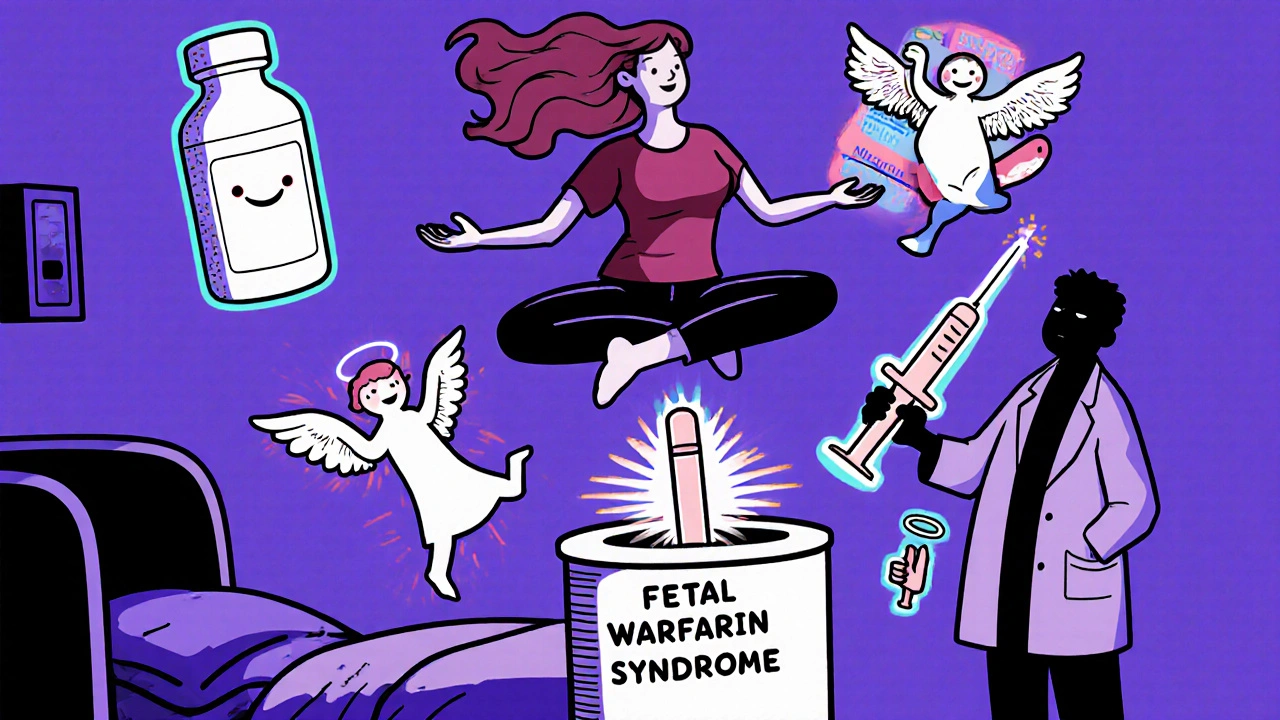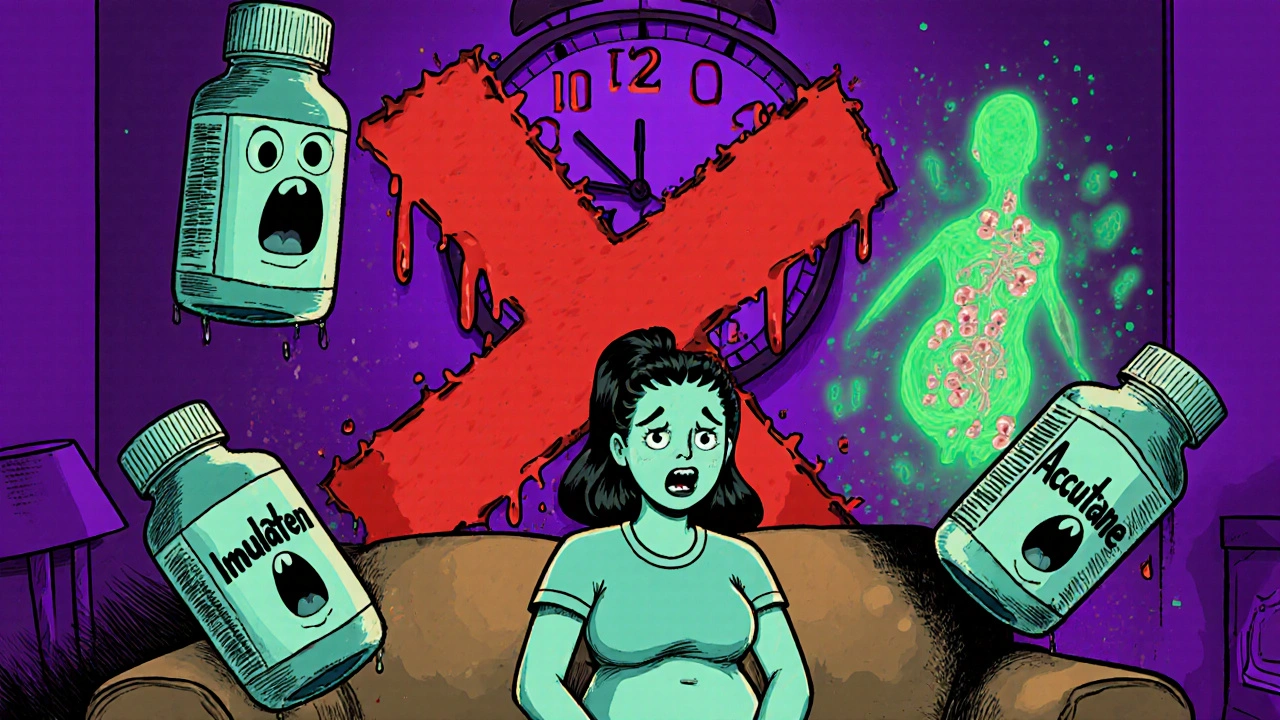When you're pregnant, every choice you make - from what you eat to what you take - can affect your baby. That’s why knowing which medications to avoid during pregnancy isn’t just a good idea - it’s essential. Many women assume that if a drug is sold over the counter, it’s safe. But that’s not true. Even common pain relievers and allergy meds can carry hidden risks, especially when used regularly or at the wrong time.
Drugs That Can Harm Your Baby - And When They’re Most Dangerous
Some medications are dangerous at any point during pregnancy. Others are risky only during certain weeks. The first trimester (weeks 1-12) is when your baby’s organs are forming. That’s the most sensitive time. But danger doesn’t end there.
NSAIDs like ibuprofen (Advil, Motrin) and naproxen (Aleve) were once thought to be safe early on. Now, the FDA warns they should be avoided entirely after 20 weeks. Why? These drugs can cause your baby’s kidneys to fail, leading to low amniotic fluid (oligohydramnios), which can result in lung underdevelopment and limb contractures. Studies show the risk doubles after 20 weeks. Even aspirin - unless prescribed in low doses (60-150 mg) for preeclampsia prevention - should be avoided because it can increase bleeding risks during delivery.
Antibiotics like doxycycline and ciprofloxacin are also off-limits. Doxycycline stains developing teeth and weakens bones. Ciprofloxacin has been linked to a 1.9 times higher risk of musculoskeletal problems in babies. ACE inhibitors (lisinopril, benazepril) and ARBs (valsartan) for high blood pressure are extremely dangerous. They can cause fetal kidney failure, low amniotic fluid, and even death. If you’re on one of these and find out you’re pregnant, stop immediately and call your doctor.
Isotretinoin (Accutane) for acne is one of the most dangerous drugs during pregnancy. It causes severe birth defects - including missing ears, heart problems, and brain abnormalities - in more than 25% of exposed pregnancies. The FDA’s iPLEDGE program requires strict controls for this drug, and women must use two forms of birth control while taking it. If you’re planning to get pregnant, stop isotretinoin at least one month before trying.
Valproic acid, used for epilepsy and bipolar disorder, carries a 10.7% risk of major birth defects - nearly four times higher than the general population. Babies exposed may have spina bifida, cleft palate, heart defects, and developmental delays. If you have epilepsy and are planning pregnancy, talk to your neurologist about switching to lamotrigine or levetiracetam, which have far lower risks.
The Acetaminophen Controversy: What You Need to Know
For decades, acetaminophen (Tylenol) was the go-to pain reliever for pregnant women. It was considered safe, even by major medical groups. But in 2025, the FDA issued a new notice to physicians warning that prolonged use - especially throughout pregnancy - may increase the risk of attention deficit hyperactivity disorder (ADHD) and autism spectrum disorder in children.
A 2021 JAMA Pediatrics study of 95,000 mother-child pairs found a 28.6% higher risk of ADHD and a 20.4% higher risk of autism in kids whose mothers used acetaminophen for more than 28 days during pregnancy. The CDC now advises women to consider avoiding it as a precaution, even though they say a direct cause hasn’t been proven.
So what do you do? The answer isn’t simple. If you have a high fever (102°F or higher), not treating it can be more dangerous than taking acetaminophen. Research shows untreated fever increases the risk of neural tube defects by 8.2 times. The key is use the lowest dose (325-650 mg) for the shortest time possible. Don’t take it daily for headaches or mild colds. Don’t combine it with other cold medicines that also contain acetaminophen. Stick to 3,000 mg max per day.
Safe Alternatives for Common Pregnancy Complaints
You don’t have to suffer through pregnancy symptoms without relief. There are safe, effective options for most common issues.
- Pain and fever: Acetaminophen is still the first choice - but use it wisely. Limit to 3-5 days at a time. If pain persists, talk to your provider. Physical therapy, warm compresses, and prenatal yoga can help with back pain and headaches.
- Allergies: Second-generation antihistamines like loratadine (Claritin), cetirizine (Zyrtec), and fexofenadine (Allegra) are considered safe. Over 2,000 pregnancies studied through the MotherToBaby registry showed no increased risk of birth defects.
- Nasal congestion: Start with saline sprays and a humidifier. If you need more, pseudoephedrine (Sudafed) is okay after the first trimester. But avoid it if you have high blood pressure - it can raise your numbers by 5-10 mmHg.
- Constipation: Drink more water and eat fiber-rich foods (25-30g daily). If that doesn’t help, docusate sodium (Colace) or polyethylene glycol (Miralax) are safe, well-studied options with no increased risk of malformations.
- Depression and anxiety: Untreated mental health conditions can lead to preterm birth and low birth weight. Paroxetine (Paxil) carries a small risk of heart defects, but other SSRIs like sertraline (Zoloft) and citalopram (Celexa) have better safety profiles. The key is not to stop your medication without talking to your doctor - relapse rates are high, and the risks of untreated depression often outweigh the medication risks.

Medications to Switch Before You Get Pregnant
Some conditions require long-term medication. If you’re planning pregnancy, don’t wait until you’re pregnant to adjust your meds.
Women on warfarin (Coumadin) for blood clots should switch to enoxaparin (Lovenox) before conception. Warfarin crosses the placenta and can cause fetal warfarin syndrome - facial deformities and bone growth problems. Enoxaparin doesn’t cross the placenta and is safe throughout pregnancy.
If you have epilepsy, switching from valproic acid to lamotrigine or levetiracetam before pregnancy can reduce your baby’s risk of major defects from over 10% to under 3%. Don’t wait - this change takes time to stabilize.
For asthma, inhaled corticosteroids like budesonide are safe and preferred. Avoid oral steroids if possible. For diabetes, insulin is the gold standard - oral medications like metformin and glyburide are sometimes used, but insulin has the most safety data.
What to Do If You’ve Already Taken a Risky Medication
Many women panic when they realize they took a risky drug early in pregnancy - often before they even knew they were pregnant. The good news? Most exposures don’t lead to problems.
Don’t panic. Don’t stop your meds abruptly. Call your doctor or reach out to MotherToBaby (a free, confidential service run by experts). They’ve helped over 2.3 million families since 2022. They’ll review your medication, timing, and dosage and give you personalized risk estimates.
Most drugs are only risky in specific windows. For example, if you took ibuprofen at week 8, the risk is low. But if you took it at week 28, you need monitoring. The same goes for acetaminophen - occasional use is very different from daily use for months.

How to Stay Safe: A Simple Action Plan
- Make a full list: Write down every medication, supplement, and herbal product you take - even aspirin or melatonin.
- Review with your provider: Bring this list to every prenatal visit. Don’t assume your OB knows what you’re taking.
- Check labels: Read OTC medicine labels. Many cold and flu products contain NSAIDs or pseudoephedrine.
- Use trusted resources: The FDA’s Pregnancy and Lactation Labeling Rule (PLLR) and MotherToBaby fact sheets are reliable. Avoid random internet searches.
- Ask before you take: If you’re unsure, wait. Call your doctor or pharmacist. It’s better to be safe than sorry.
What’s Changing - And What to Watch For
The landscape of pregnancy medication safety is shifting fast. The FDA’s 2025 notice on acetaminophen is just the beginning. Legal actions are mounting - over 100 lawsuits have been filed against manufacturers for not warning about neurodevelopmental risks. The first major trial is set for March 2024.
Meanwhile, research continues. The ABC Study - tracking 50,000 pregnant women across 15 countries - will give us clearer answers by 2026. ACOG is updating its guidelines to reflect the new acetaminophen data. The European Medicines Agency has already banned ibuprofen after 24 weeks, stricter than the U.S.
One thing is clear: blanket rules don’t work. Every pregnancy is different. Every medication has trade-offs. The goal isn’t to avoid all drugs - it’s to use the right ones, at the right time, in the right dose.
Is it safe to take Tylenol while pregnant?
Acetaminophen (Tylenol) is still considered the safest pain reliever during pregnancy when used at the lowest effective dose for the shortest time. However, new FDA guidance from September 2025 advises caution with prolonged use - especially daily or throughout pregnancy - due to possible links to ADHD and autism. Use only when necessary, stick to 325-650 mg per dose, and never exceed 3,000 mg daily. Avoid using it for mild symptoms like occasional headaches or low-grade fevers unless advised by your provider.
Can I take ibuprofen during pregnancy?
No - not after 20 weeks. The FDA warns that ibuprofen and other NSAIDs can cause fetal kidney damage and low amniotic fluid, which can lead to serious complications. Even before 20 weeks, it’s best to avoid them unless your doctor specifically recommends it. For pain relief, switch to acetaminophen instead. If you’ve taken ibuprofen early in pregnancy, don’t panic - the risk is much lower before 20 weeks. But stop immediately if you’re past that point.
What’s the safest allergy medicine during pregnancy?
Loratadine (Claritin), cetirizine (Zyrtec), and fexofenadine (Allegra) are the safest choices. These second-generation antihistamines have been studied in thousands of pregnancies and show no increased risk of birth defects. Avoid first-generation options like diphenhydramine (Benadryl) for regular use - they can cause drowsiness and may affect fetal development with long-term exposure. Always check labels to make sure you’re not getting a combination product with decongestants.
Are antidepressants safe during pregnancy?
Some are, and some aren’t. Paroxetine (Paxil) carries a small but real risk of heart defects and should be avoided. Sertraline (Zoloft) and citalopram (Celexa) have the best safety data. The bigger risk is untreated depression - which increases preterm birth and low birth weight by over 60%. Never stop antidepressants without talking to your doctor. The goal is to find the lowest effective dose that keeps you stable. Many women successfully manage depression with therapy and medication during pregnancy.
What should I do if I took a risky medication before knowing I was pregnant?
Don’t panic. Most exposures don’t cause harm. Call your doctor or contact MotherToBaby (1-866-626-6847 or mothertobaby.org) for a free, confidential consultation. They’ll review the drug, when you took it, and how much. For example, taking ibuprofen at week 6 is very different than at week 26. They’ll help you understand your actual risk and whether any extra monitoring is needed. Most women get reassurance - and peace of mind.


Comments
Amanda Wong
November 25, 2025 AT 22:04The FDA's new acetaminophen warning is long overdue. I've been telling my OB-GYN for years that daily Tylenol use during pregnancy is a recipe for neurodevelopmental chaos. The JAMA study wasn't groundbreaking-it was confirmation. Yet somehow, doctors still hand it out like candy. If you're taking it for a headache three times a week, you're not being cautious-you're being negligent.
Stephen Adeyanju
November 26, 2025 AT 20:07ibuprofen after 20 weeks is a hard no but what about before that I took it at 8 weeks and my kid is 5 and brilliant so maybe the science is just hype
james thomas
November 27, 2025 AT 07:07Let’s be real-this whole thing is Big Pharma’s way of controlling pregnant women’s choices under the guise of ‘safety.’ They banned ibuprofen because they want you buying Tylenol, which is now being painted as the new villain. Meanwhile, the real culprits? Environmental toxins, processed food, and stress. But nope, let’s blame the 325mg pill you took for your migraine. Classic scapegoating. And don’t even get me started on the ‘iPLEDGE’ program-more like iCONTROL. We’re turning pregnancy into a prison sentence with a pharmacy checklist.
Deborah Williams
November 28, 2025 AT 14:21It’s fascinating how we’ve built an entire medical culture around fear-based compliance rather than trust-based autonomy. We tell women to avoid every possible risk, yet we rarely acknowledge the profound risk of maternal anxiety, isolation, and guilt. The same women who are terrified of Tylenol are often the ones who don’t sleep, don’t eat well, and don’t seek emotional support because they’re too busy policing their own behavior. Maybe the real danger isn’t the medication-it’s the shame we’ve normalized around pregnancy.
Kaushik Das
November 28, 2025 AT 23:25As someone from India where paracetamol is sold like candy on street corners, I can say this: the real issue isn’t the drug-it’s the lack of access to proper prenatal care. In many places, women don’t have a doctor to consult at all. So when Western guidelines say ‘avoid acetaminophen,’ it sounds like luxury advice. The truth? A fever of 103°F without treatment is far more dangerous than any pill. We need context, not dogma. Also, I’ve seen three pregnant cousins take Tylenol daily for back pain and all delivered healthy babies. Science is evolving, but humans aren’t lab rats.
Asia Roveda
November 30, 2025 AT 04:01They’re coming for our meds next. First it’s caffeine, now acetaminophen, soon it’ll be ‘don’t breathe air near highways while pregnant.’ This isn’t medicine-it’s moral panic dressed in white coats. The CDC says ‘precaution’ but they mean ‘guilt trip.’ And don’t get me started on the lawsuit frenzy. Someone’s gonna make millions off this fear. Meanwhile, actual healthcare access for pregnant women? Still a joke.
Micaela Yarman
December 1, 2025 AT 16:49While I appreciate the thoroughness of this post, I must emphasize that the language of ‘avoidance’ and ‘danger’ may inadvertently foster a climate of fear rather than informed agency. Pregnant individuals deserve nuanced, evidence-based guidance-not alarmist framing that conflates correlation with causation. The distinction between occasional and prolonged use is critical, yet often lost in translation. One must not mistake the precautionary principle for a prohibition.
mohit passi
December 2, 2025 AT 10:03bro just chill 🤙
my sister took tylenol every day for 3 months during her preg and her kid is now a chess champ
also ibuprofen at 10 weeks? no biggie
stop scaring people with studies that say ‘maybe’
pregnancy is already stressful enough without becoming a pharmaceutical detective
if you’re worried talk to your doc not reddit
Aaron Whong
December 3, 2025 AT 09:17The epistemological framework underpinning contemporary obstetric pharmacovigilance is fundamentally reductionist. We are engaging in a form of biomedical determinism where discrete pharmacological agents are assigned causal agency over complex neurodevelopmental phenotypes, despite the absence of mechanistic plausibility in most cases. The confounding variables-maternal stress, socioeconomic status, gestational nutrition, environmental toxin exposure-are systematically marginalized in favor of pharmacological scapegoating. This is not medicine; it is statistical fetishism masquerading as public health.
Sanjay Menon
December 5, 2025 AT 01:30Of course the FDA waits until after the fact to issue warnings. It’s always the same. We sacrifice the health of mothers and children on the altar of corporate profit, then slap a warning label on it like it’s a new feature. And the media? They amplify the panic without context. Meanwhile, the pharmaceutical giants who made billions selling these drugs? Still on the board of every medical association. This isn’t safety-it’s damage control with a side of virtue signaling.
Brittany Medley
December 6, 2025 AT 07:13Thank you for this incredibly detailed, compassionate, and evidence-based guide. I’ve shared it with my prenatal group and everyone is grateful. One small addition: if you’re on any medication and find out you’re pregnant, please don’t stop it cold turkey. That’s when the real danger begins. Call your provider, call MotherToBaby, and get personalized advice. You’re not alone in this.
Marissa Coratti
December 7, 2025 AT 09:23It is imperative to recognize that the evolving landscape of prenatal pharmacological safety is not merely a function of new scientific findings, but also a reflection of heightened societal scrutiny, increased data transparency, and the long-overdue prioritization of fetal neurodevelopmental outcomes in clinical research paradigms. While individual risk profiles vary significantly, the cumulative weight of longitudinal cohort studies-including the ABC Study and the JAMA Pediatrics meta-analysis-demands a paradigm shift from reactive caution to proactive, preconception medication optimization. The moral imperative is not to eliminate all pharmacological exposure, but to ensure that every medication decision is informed, intentional, and individualized, grounded in both empirical evidence and empathetic clinical dialogue.
Ali Miller
December 7, 2025 AT 11:18Let’s be honest-this isn’t about science. It’s about control. The same people who tell you not to take Tylenol are the ones who cut prenatal care funding, block abortion rights, and ignore maternal mortality rates. They want you scared, compliant, and silent. If you’re worried about your meds, talk to your doctor-not a Reddit post. But if your doctor’s just pushing fear? Find a new one. Your body, your choices. Period.